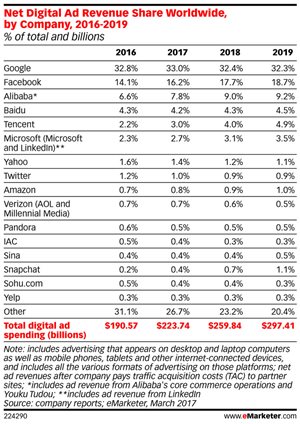Will 2018 Be “Tecklash” or the Year of Trust?
2018 kicked off with so many controversial discussions around Net Neutrality. Coined by  Columbia University media law professor Tim Wu in 2003, Net Neutrality is the basic principle that prohibits internet service providers from speeding up, slowing down or blocking any content, applications or websites you want to use.
Columbia University media law professor Tim Wu in 2003, Net Neutrality is the basic principle that prohibits internet service providers from speeding up, slowing down or blocking any content, applications or websites you want to use.
After Salesforce chairman and CEO Marc Benioff‘s bold accusation for the leaders of Silicon Valley tech companies and the government “abdicating their responsibilities,” Keith Weed, Unilever’s Chief Marketing Officer has recently joined a long line of executives and other elites in the tech and digital ad industries who have raised concerns about the dangers of technology products and services. Not only did he criticize the lack of control over the content being delivered to consumers via Google and Facebook; but also threatened to boycott sites that "breed division" as a result.
Given Unilever is the fourth-largest global advertising spender and the largest consumer goods company, responsible for the making of Ben & Jerry's ice cream, Vaseline and Dove soap to name a few, without question, the company’s ad budget holds a lot of sway over the digital ad industry. However, the question is; would a threat to withdraw advertising from sites like Facebook, Google, Twitter, Snap, and Amazon be enough to make the internet a more ethical and transparent sphere?
Apparently, the problem goes beyond Facebook or Google, however, regulating social media may be a good start. The more influential individuals and organizations that raise concerns about tech companies having to lift their game on transparency and privacy, the more pressure the government will feel to be proactive in regulation. However, I am getting ahead of myself here. First, let’s discuss what is wrong with the internet and then what solutions the industry veterans think would mitigate the issue.
According to Unilever’s Keith Weed, the company could no longer "meet the values of one while holding the other at arm's length.” What does he mean by that? Today’s savvy modern consumers’ tendency to support brands which they have a connection with. For brands, one of the ways of generating that connection is developing a socially conscious brand identity as it creates a strong sympathy from the audience. Considering Unilever has been making significant moves to build a brand identity that has a social responsibility, it is not shocking to hear that the organization wants to prioritize investing only in responsible platforms that were committed to creating a positive impact in society.
holding the other at arm's length.” What does he mean by that? Today’s savvy modern consumers’ tendency to support brands which they have a connection with. For brands, one of the ways of generating that connection is developing a socially conscious brand identity as it creates a strong sympathy from the audience. Considering Unilever has been making significant moves to build a brand identity that has a social responsibility, it is not shocking to hear that the organization wants to prioritize investing only in responsible platforms that were committed to creating a positive impact in society.
For those who are not very familiar with Unilever’s social movements; the FMCG giant has long dedicated its operations to tackling gender and beauty stereotypes in advertising and also launched The Unilever Sustainable Living Plan (USLP) which is the company’s blueprint for achieving its vision to grow its business, whilst decoupling its environmental footprint from its growth and increasing its positive social impact.
"We can't do anything to damage that trust - including the choice of channels and platforms we use", Weed said at the IAB Annual Leadership Meeting conference. "We are spending far too much time talking about what are, essentially, hygiene factors. Fake news, racism, sexism, terrorists spreading messages of hate, toxic content directed at children. It is in the digital media industry's interest to listen and act on this", Weed added.
He also cited from research showing a big drop in trust in social media companies and a "perceived lack of focus" in addressing "illegal, unethical and extremist behavior and material on their platform." For that very reason, Facebook and other content delivery channels have been investing in altering their algorithms as well as performance measurement metrics in an effort to spark more " meaningful social interactions."
Has Boycotting Ever Worked?
Yes, it has. Last year, after the investigations by the BBC and The Times that reported finding obscene comments on videos of children uploaded to YouTube, more than 250 brands, from L'Oreal to McDonald's, Audi, and HSBC, reportedly pulled their spend from Google's services. What led brands to boycott was the brand safety issues such as ads appearing next to violent, extremist or hateful content, and grotesque videos targeted at children.
Matthew John Brittin, President of EMEA Business & Operations for Google, explained why it is so hard to maintain brand safety: “400 hours of user-generated video are uploaded to YouTube every minute and thousands of websites added to Google's AdSense network each day, which makes it extremely difficult to police which content is safe for brands to advertise against and which isn't. And that's not to mention the fact that Google doesn't want to curtail free speech in the process.”
At the end of the day, the Google-owned video service has since introduced a series of changes aimed at limiting the types of videos that can run ads, and most brands have resumed marketing on the platform.
Weed’s counterpart at Procter & Gamble, Marc Pritchard, made exactly the same move last year. The packaged-goods giant reported that it pulled back approximately $100 million to $140 million in digital advertising spend, again, because of brand safety concerns and ineffective ads. Pritchard threatened not only media but also agencies who do not get on board with standards. The company called them to clean up transparency and demand that all platforms provide third-party measurement.
“We’re setting a higher standard of excellence on advertising quality with a focus on brand performance claims that communicate the brand’s benefit superiority to create awareness and trial,” said CEO David Taylor during the earnings call. “We’re improving the quality of consumer insights, agency creative talent, and production.”
What Are Tech Companies Supposed To Do?
"2018 is either the year of the 'tech-lash,' where the world turns on the tech giants — and we have seen some of this already — or the year of the trust," Weed said in his prepared remarks. "The year where we collectively rebuild trust back in our systems and our society."
Former President Barack Obama made some revealing comments about the power that the tech giants wield over the distribution of online content in an off-the-record speech at a sports conference at MIT. Obama said social-media platforms like Facebook and Google were exacerbating the problem and added that those outlets could better acknowledge their effect on "shaping our culture in powerful ways."
As mentioned earlier, the problem goes beyond Google and Facebook, however, it is also  important to note that these two companies have a lot of pulling power as they take 66.1% of all digital video ad dollars, according to eMarketer.
important to note that these two companies have a lot of pulling power as they take 66.1% of all digital video ad dollars, according to eMarketer.
Trust in media has hit an all-time low, according to the Edelman Trust Barometer. Australia now has the second lowest trust in media globally, beating only Turkey. The study found out that while Australians trust traditional media more than they did a year ago, falling trust in social media, owned media and search engines has led to an overall decrease in media trust. Also, trust has declined in all four major intuitions – government, business, media, and NGOs, for the second consecutive year, according to the research.
The same study suggests that social media trust levels declined from 28% to 23%, well below the global mark of 40%. Owned media fell from 29% to 26% while trust in search engines dropped from 58% to 47%.
Facebook had already announced plans to combat malicious content by investing in artificial intelligence and recruiting 3,000 new staff to monitor posts flagged by users. According to NBC News, Adam Mosseri, who oversees Facebook’s news feed, told attendants at the ReCode conference in Huntington Beach, California that he appreciated Weed’s comments, promising “it’s up to us to deliver.” Campbell Brown, a former television newswoman who oversees Facebook’s news partnerships, said the site is "working in the next months — and it’s already underway — to define quality sources of news" and make sure that's what gets to the public.
According to Weed, this shouldn't be a battle only between brands and tech companies as he holds marketers and agencies accountable as well. On that note, in an Advertising Week Europe session, Interpublic Group Chairman and CEO Michael Roth said: “We made a conscious decision not to freeze [ad spending]." He also reported that Interpublic has spoken with Google and chose to hold them accountable for solving the problem rather than pulling ads. "If they don't, it'll adversely affect them economically," he added. "In the end, the best way to fix it is to hold them economically accountable."
Brittin noted that they have been reviewing the three key areas: policies, controls for advertisers, and enforcement to make them simpler for advertisers to use, with default settings at a safer level. Regarding enforcement, he claimed that already 98% of flagged content is reviewed within 24 hours and that 300 million YouTube videos, and hundreds of thousands of websites, were removed from the advertising ecosystem last year, but he confirmed that it is not enough and promised to "raise the bar" on policy.
Salesforce Giving Back to the Community
On a slightly different note, Salesforce.org (the nonprofit arm of Salesforce) built a new app called Philanthropy Cloud. The app, which will be distributed by mega-charity the United Way, will enable employees of big companies to their corporate-matched donations and offer a platform to encourage more giving, more volunteering, and more connection to the causes being funded. Though it’s being piloted at a handful of major companies, including Anheuser-Busch, it will be available widely in June 2018. Bill Bradley, Anheuser-Busch’s vice president for community affairs said: “We are always looking to better engage our colleagues and encourage them to grow their own personal impact, and in turn that of our entire company.”
Benioff, whose grandfather was acting mayor of San Francisco and an early advocate for BART, is the fourth generation of his family to live in San Francisco. Long an advocate for tech companies giving back to the community, he has become the most influential individual in the Bay Area and the country. He is not only integrating philanthropy into his organization but also pushes other companies to join the movement, and this is where his strong leadership skills come into play. As an example, he proposed that 20 tech companies give at least $500,000 each to a new organization called SF Gives, which aims to fight poverty in the Bay Area.
My POV
Unilever is not the first organization calling out media for choosing the right thing over generating more financial profit, and it certainly won’t be the last one. I definitely see their point and it is a noble movement to make the internet a more ethical and transparent sphere.
On the other hand, brands also need to clean up their act when it comes to how they utilize digital media to employ certain marketing tactics. One of the most popular tactics to expand a reach, for instance, is personalization. As we have discussed so many times here at CMS-Connected, “personalization” has lately been veering into the “creepy” territory which serves no one. This situation essentially leaves consumers with the feeling of being watched, stalked, or uncomfortable.
I understand that the engineers who created machine learning/personalization algorithms might not anticipate its outcomes. However, this situation shouldn’t result in the lack of transparency towards users to the extent that the options and information consumers are exposed to go beyond their ability to control. As digital transformation continues to engulf everything in its path, opportunities and challenges will equally get off the ground. These ethical disruptive outcomes are one of those serious challenges for society as due to their power, they go beyond the intended scope of use. Keep in mind, technology providers, especially, social media companies, cannot simply absolve themselves of any responsibility in this area.
Overall, we need more privacy laws and programs around the world to truly regulate the internet and banish the doubts coming from a somewhat distrusting consumer base because that way, not only will they be informed about how brands and media actually collect their data and what it will be used for but also they will be empowered by having an option to choose to have personalized experiences based on that data or experiences without being filtered.

Venus Tamturk
Venus is the Media Reporter for CMS-Connected, with one of her tasks to write thorough articles by creating the most up-to-date and engaging content using B2B digital marketing. She enjoys increasing brand equity and conversion through the strategic use of social media channels and integrated media marketing plans.